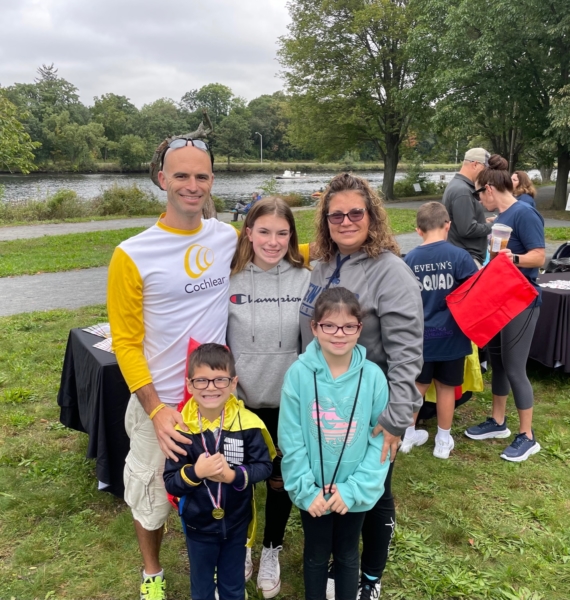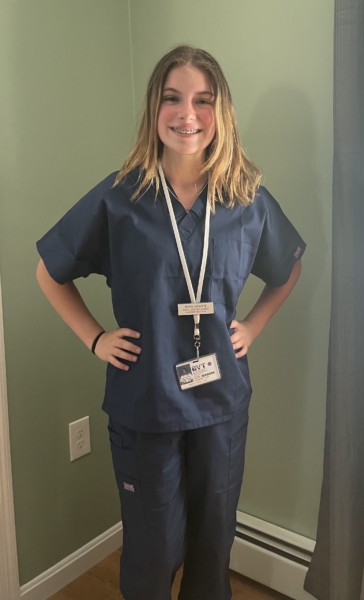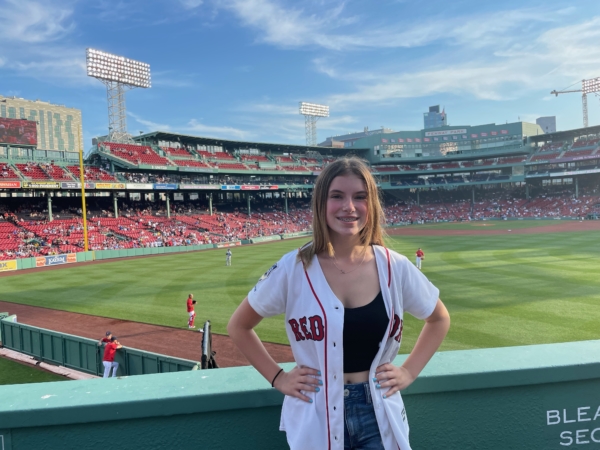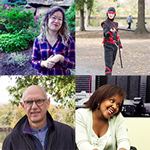Faces Behind the Screen: Eric Costanza
Quick Links
<< Return to all “Faces Behind the Screen” stories

Eric, Trysta, and family at the 2021 New England Walk4Hearing.
During the 2021 New England Walk4Hearing, we had the pleasure of conducting interviews with a few attendees. In this conversation, we spoke with Eric Costanza, whose daughter Trysta was born with profound hearing loss and has cochlear implants. Trysta is now 16 years old and an honor roll student at Blackstone Valley Technical High School. She’s an accomplished dancer and runner, and she loves the Boston Red Sox.
Read on to learn about Trysta and her family’s journey with hearing loss.
Can you tell me a bit about your journey parenting a child with hearing loss?
ERIC: Trysta was born profoundly deaf in September 2005. I’m actually not her biological father; I met her when she was 11 months old. When she was about 13 months, she had her first side of cochlear implants done. About six months later, she had her other side done. They took wonderfully.
My wife and I started learning sign language, but in all honesty, it wasn’t something that we even needed to continue because of how great Trysta did when she got her cochlear implants.
Trysta did early interventions for the first few years. When she started preschool, she had an IEP and had special services, but now she’s 16 and is doing remarkably well. To be candid, my wife and I sometimes completely forget that she’s deaf. We’ve tried to teach her from a very young age that needing cochlear implants to hear is like someone who has to wear glasses to see. It’s just part of who she is, and it doesn’t completely define her. She’s proud of that. As a typical teenager, she doesn’t like to bring attention to herself, but she knows it’s just part of who she is.
We go in for three-year evaluations at the Clark School for the Deaf in Northampton. At our last visit, they basically told us that she is the definition of why someone should get cochlear implants as early as she did. They also said that she’s an expert lip reader, which comes in handy when I’m watching sports. As her dad, I’m very proud of her.
How have you dealt with any challenges throughout Trysta’s adolescence?
ERIC: Trysta got bullied a bit in middle school. It wasn’t that bad and didn’t last very long, but there was a bit of time when she got bullied and kids would say things like “deaf and dumb.” She’s obviously nowhere near dumb—she’s an honor roll student in a mainstream school.
We handled it by talking to her and letting her know that what kids were saying was obviously not true. We talked to the school about it, too. It was upsetting for her, but over time it got better with a good support system. She has good friends and family, and it showed her who her true friends were.
Other than that, there was one time when she was three or so and she bumped her head on her car seat, and it dislodged one of the inner pieces of her cochlear implant. She had surgery to fix that. Everything worked and was fine, but it was scary at the time with a toddler and a major challenge.

Trysta working as a dental assisting student for Blackstone Valley Technical High School.
Prior to meeting Trysta, had you had any experience with people who are d/Deaf or hard of hearing?
ERIC: No, I hadn’t. My wife’s side has a few people who are hard of hearing, but I had no experience. To be honest, I had no idea cochlear implants existed. I didn’t know that if someone was born deaf, we have the technology now to help them hear. And now 15 years later, I talk about Trysta to my friends and to my coworkers as much as I can. There are still a lot of people who have no idea hearing is even possible for someone born deaf. It’s like someone who was born blind and can now see.
Do you have any advice for parents who learn their child is deaf?
ERIC: Every situation is different. In general, just speaking from our experience, the earlier you go through the process for cochlear implants, if you’re interested in them, the better. It’s kind of like anything. We taught my six-year-old to ice skate a few years ago, and now he’s skating circles around me. Kids are incredibly resilient. The earlier you start, the better.
I know it’s hard to go into a major type of brain surgery, but in my opinion, you’re setting up your child for success down the line by doing that. And the little bit of anxiety and pain that goes on at the time is well worth it for the rest of their lives.
There is a lot of disagreement about whether kids should have cochlear implants or grow up signing. How do you talk with Trysta or other parents about that?
ERIC: I respect everyone’s opinion. In my opinion, the technology is here for a reason, but if someone feels differently, I respect that.
I haven’t had many conversations like that with Trysta. I think she’s aware of the disagreements, but that hasn’t really run into our lives yet as far as her asking, “Hey, this person’s deaf. Why don’t they have a cochlear implant?” That hasn’t really come up yet, but I’m sure it will. And when it does, that’s probably what I would say.

Trysta at a Boston Red Sox game.
Does your family ever turn on captions? What is it like watching movies and television together?
ERIC: To be honest, we don’t do that typically. However, Trysta does all the time. When she’s watching TV by herself, she almost always has closed captioning on. We probably could do a better job of doing that as a family. She definitely prefers to have the captioning on when she’s watching TV by herself.
I think she almost feels bad about turning the captions on as a family, so we have kind of just gone with that. But when she’s watching TV by herself, she always has captions on.
What have you learned parenting a deaf child? What has Trysta taught you in relation to her experience with cochlear implants?
ERIC: She’s taught me to be more patient. Obviously, she’s my daughter and I love her, and I don’t look at her any different from my other kids. But there’s just a little something special with her because of the experience that she’s been through. She’s almost more mature and more responsible and organized, and almost has a worldly way about her, more than maybe someone else her age, I think because of the experience that she’s been through. I’m just very proud of her. She’s really learned to advocate for herself.
When I see other people with cochlear implants or any disability, or their parents, I have a different kind of understanding of what they’re going through.
Faces Behind the Screen would like to extend a huge ‘thank you’ to the Hearing Loss Association of America (HLAA) for hosting this interview at the New England Walk4Hearing in Fall of 2021.
Faces Behind the Screen would also like to thank Eric Costanza for participating in our storytelling project. If you’re interested in sharing your story with us, please fill out our nomination form.
Faces Behind the Screen is a storytelling project focusing on members of the Deaf and hard of hearing community.



